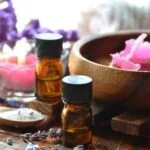How does aromatherapy affect sleep patterns? Aromatherapy is a holistic and natural approach to improving overall well-being, including promoting better sleep. This article aims to provide an in-depth understanding of the relationship between aromatherapy and sleep patterns. By exploring the science behind aromatherapy, understanding common essential oils for sleep, learning aromatherapy techniques for better sleep, and considering potential risks, readers will gain valuable insights into how aromatherapy can positively impact their quality of sleep.
Aromatherapy involves using essential oils extracted from plants to promote physical and psychological well-being. These essential oils can be inhaled, applied topically, or used in a diffuser to create a relaxing atmosphere. In relation to sleep patterns, aromatherapy has been found to have calming and sedative effects, making it an attractive option for those struggling with insomnia or disturbances in their sleep.
Understanding the science behind how aromatherapy affects sleep is crucial for appreciating its potential benefits. Research suggests that certain essential oils can impact the brain’s emotional center and nervous system, leading to feelings of relaxation and tranquility. By delving into this connection between aromatherapy and sleep, individuals can make informed decisions about incorporating aromatherapy into their daily routine for better sleep quality.
Understanding Aromatherapy
Aromatherapy is a holistic healing treatment that uses natural plant extracts to promote health and well-being. Essential oils, the key components of aromatherapy, are highly concentrated extracts derived from various parts of plants, including flowers, leaves, and roots. These essential oils can be inhaled or applied topically to provide a wide range of benefits, including improving sleep patterns.
The use of aromatherapy for sleep has gained popularity due to its natural and non-invasive approach to addressing sleep issues. Many essential oils have been found to have sedative properties that can help calm the mind and body, making it easier to fall asleep and improve overall sleep quality. Lavender, chamomile, and sandalwood are some of the most commonly used essential oils for promoting relaxation and inducing sleep.
Research has shown that aromatherapy can have a positive impact on sleep patterns by influencing the limbic system, which is responsible for emotions, memories, and arousal. When inhaled, the aroma from essential oils can stimulate certain neurotransmitters in the brain that promote relaxation and reduce stress and anxiety. Additionally, the act of incorporating aromatherapy into a bedtime routine can serve as a signal to the brain that it is time to wind down and prepare for sleep.
| Aromatherapy Essential Oil | Sleep Benefits |
|---|---|
| Lavender | Calming and relaxing properties that promote better sleep |
| Chamomile | Natural sedative effects that aid in reducing insomnia |
| Sandalwood | Relieves anxiety and promotes mental clarity for improved sleep |
The Science Behind Aromatherapy and Sleep
Aromatherapy has been gaining attention for its potential to impact sleep patterns in a positive way. It is believed that certain essential oils used in aromatherapy can have a calming effect on the brain and nervous system, ultimately promoting relaxation and improving sleep quality.
Impact of Aromatherapy on the Brain and Nervous System
Research suggests that inhaling the aroma of essential oils can stimulate the olfactory system, which is connected to the brain’s limbic system. The limbic system plays a crucial role in regulating emotions, behavior, and long-term memory – all of which are closely linked to sleep patterns. When specific essential oils are inhaled, they can trigger responses in the brain that promote relaxation and reduce stress levels, creating an environment conducive to better sleep.
Research and Studies on the Benefits of Aromatherapy for Sleep
Several studies have been conducted to explore how aromatherapy affects sleep patterns. For example, a study published in the Journal of Alternative and Complementary Medicine found that lavender oil used in aromatherapy increased the percentage of deep or slow-wave sleep in participants.
Another study from the Sleep Medicine Research Center demonstrated that using a blend of essential oils improved both sleep quality and reduced symptoms of anxiety in subjects with insomnia. These findings provide scientific evidence supporting the use of aromatherapy for promoting better sleep.
Overall Impact
Understanding how aromatherapy affects sleep patterns involves recognizing its direct influence on key areas of the brain and nervous system. By targeting these systems with specific essential oils, individuals may experience improved relaxation, reduced stress levels, and ultimately better sleep quality. This reinforces why many people turn to aromatherapy as a natural aid for addressing their sleep issues.
Common Essential Oils for Sleep
When it comes to using aromatherapy for improving sleep, certain essential oils have been found to be particularly effective in promoting relaxation and inducing a restful state. These essential oils can be used in various ways, including through diffusers, sprays, or topically. Here are some of the most common essential oils known for their sleep-inducing properties:
- Lavender: Perhaps one of the most well-known essential oils for promoting relaxation, lavender has been extensively studied for its calming effects on the nervous system.
- Chamomile: Chamomile essential oil is renowned for its soothing and sedative properties, making it an excellent choice for those struggling with sleeplessness or anxiety.
- Ylang Ylang: With its sweet and floral aroma, ylang-ylang essential oil is often used to reduce stress and promote a sense of calm, making it an ideal choice for enhancing sleep quality.
- Sandalwood: This woody and grounding essential oil is known for its ability to quiet the mind and create a tranquil atmosphere, making it beneficial for those dealing with insomnia or racing thoughts at bedtime.
Incorporating these essential oils into your bedtime routine can be done in various ways. Some individuals prefer to diffuse the oils in their bedroom before going to bed, while others may opt to mix them with carrier oils and apply them topically or add them to a relaxing bath. Experimenting with different methods can help determine which approach works best for you in improving your sleep quality.
How Does Aromatherapy Affect Sleep Patterns?
Research suggests that the inhalation of certain aromatic compounds found in essential oils can have a direct impact on brain function and activity within the nervous system. The olfactory system plays a crucial role in processing scents, which then influences areas of the brain responsible for regulating emotions, stress responses, and ultimately sleep-wake cycles.
By leveraging the calming and sedative properties of specific essential oils through aromatherapy practices, individuals can potentially improve their ability to relax, unwind, and transition into restful sleep more effectively.
Aromatherapy Techniques for Better Sleep
Aromatherapy is a holistic healing treatment that uses natural plant extracts to promote health and well-being. The use of essential oils in aromatherapy can positively impact sleep patterns by creating a calming and relaxing atmosphere, reducing stress, and promoting a sense of tranquility. Many individuals have turned to aromatherapy as a natural remedy for improving the quality of their sleep.
Using aromatherapy for better sleep involves various techniques to incorporate essential oils into your bedtime routine. One common method is through the use of a diffuser, which disperses the aroma of the essential oil throughout the air, creating a soothing environment. Additionally, creating homemade linen sprays with essential oils can enhance the ambiance of your bedroom and promote relaxation.
Another effective technique for utilizing aromatherapy for improved sleep is topical application. Diluting essential oils with a carrier oil and applying them to pressure points or specific areas of the body can provide a direct and targeted effect. This method allows for the absorption of the essential oil’s properties through the skin, contributing to its potential benefits for sleep.
In addition to these techniques, incorporating aromatherapy into your bedtime routine can also involve using scented candles, taking aromatic baths with essential oils, or even creating personalized sleep-inducing blends. Experimenting with different methods and finding what works best for you is key to harnessing the potential benefits of aromatherapy for improved sleep patterns.
| Aromatherapy Technique | Benefits |
|---|---|
| Diffuser | Creates a soothing environment by dispersing essential oil aroma |
| Topical Application | Direct and targeted effect on specific areas of the body |
| Candles/Baths/Blends | Personalized approach to incorporating aromatherapy into bedtime routine |
Personal Experiences With Aromatherapy
Benefits of Aromatherapy for Better Sleep
Many individuals have reported positive experiences with using aromatherapy to improve their sleep patterns. The calming and relaxing effects of essential oils have been particularly beneficial for those struggling with insomnia or poor sleep quality. Aromatherapy helps create a conducive environment for relaxation and deep rest, allowing individuals to drift off into a peaceful slumber.
Testimonials From Aromatherapy Users
There are numerous personal testimonials from individuals who have incorporated aromatherapy into their bedtime routine and witnessed improvements in their sleep patterns. Some have shared anecdotes about how using lavender essential oil in a diffuser helped them unwind and fall asleep faster, while others have found that chamomile or ylang-ylang oil has reduced feelings of anxiety and restlessness before bedtime.
Customizing Aromatherapy Techniques
One of the significant advantages of aromatherapy is the ability to customize it according to individual preferences and needs. Users can experiment with different essential oils, methods of application, and combinations to find what works best for them. This adaptability allows for a personalized approach to using aromatherapy for better sleep, catering to varying preferences and responses.
Overall, personal experiences highlight the potential effectiveness of aromatherapy in positively impacting sleep patterns. While individual responses may differ, many have found that incorporating aromatherapy into their nightly wind-down routine has contributed to improved relaxation and quality of sleep.
Including essential oils as part of your daily rituals may not always work as intended; finding the right fragrance or combination might involve some trial-and-error testing until you find just the right one or blend.
Potential Risks and Considerations
When considering using aromatherapy for improving sleep patterns, it is important to be aware of the potential risks and considerations associated with this practice. While aromatherapy can offer numerous benefits for promoting relaxation and better sleep, it is essential to take certain precautions to ensure safety and effectiveness.
One of the potential risks of aromatherapy for sleep is the possibility of allergic reactions or sensitivities to certain essential oils. Some individuals may have sensitivities to specific scents or components of essential oils, which can lead to adverse reactions such as skin irritation, respiratory issues, or headaches. It is crucial to perform a patch test before using any new essential oil and to dilute them properly when applying them topically.
Furthermore, some essential oils used in aromatherapy can interact with certain medications or medical conditions. For example, individuals taking sedatives, antidepressants, or other medications should consult with a healthcare professional before using aromatherapy for sleep. Additionally, pregnant women should exercise caution when using certain essential oils as they may have an impact on pregnancy and fetal development.
In addition to considering individual sensitivities and medical conditions, it is important to practice proper usage and storage of essential oils for aromatherapy. Essential oils should be kept out of reach of children and pets due to their concentrated nature.
Moreover, using excessive amounts of essential oils or prolonged exposure to strong scents can potentially lead to nausea, dizziness, or respiratory discomfort. By understanding these potential risks and considerations, individuals can safely integrate aromatherapy into their sleep routine while maximizing its benefits.
Conclusion
Aromatherapy has shown to have a significant impact on sleep patterns, with various essential oils and techniques being used to promote better quality sleep. By understanding the science behind aromatherapy and its effects on the brain and nervous system, individuals can effectively incorporate this alternative therapy into their bedtime routine. Research and studies have also supported the benefits of aromatherapy for sleep, further validating its effectiveness in improving sleep patterns.
When it comes to using essential oils for sleep, there are several popular options known for their sleep-inducing properties. Lavender, chamomile, and bergamot are just a few examples of essential oils that can be diffused using a diffuser, sprayed onto pillows and linens, or applied topically to help promote relaxation and better sleep.
It’s important to note that each individual may respond differently to specific essential oils, so it may require some experimentation to find the most effective option.
Incorporating aromatherapy into your bedtime routine can be done through various techniques such as diffusing essential oils in the bedroom, adding a few drops of oil to a warm bath before bed, or creating a relaxing atmosphere with calming scents. Additionally, setting the mood with dim lighting, soothing music, and other relaxation techniques can enhance the overall experience.
Ultimately, using aromatherapy as part of a bedtime ritual can help signal the body and mind that it’s time to wind down and prepare for rest.
Additional Resources
In conclusion, it is evident that aromatherapy can have a significant impact on sleep patterns. The use of essential oils and various aromatherapy techniques has been shown to promote relaxation, reduce stress, and create a calming atmosphere conducive to better sleep. The science behind aromatherapy reveals its influence on the brain and nervous system, further supporting its potential to improve sleep quality.
By understanding the different types of aromatherapy methods and essential oils commonly used for sleep, individuals can explore and experiment with what works best for them. Whether it is through diffusers, sprays, or topical application, there are numerous ways to incorporate aromatherapy into one’s bedtime routine. Additionally, the personal experiences shared by individuals who have benefited from using aromatherapy for sleep serve as real-life testimonials of its effectiveness.
While it is important to consider potential risks and precautions when using aromatherapy for sleep, the overall benefits seem to outweigh the associated risks. As such, readers are encouraged to delve further into the world of aromatherapy and explore additional resources related to this topic. Ultimately, by embracing aromatherapy as a natural and holistic approach to improving sleep patterns, individuals may find themselves on a path towards enhanced relaxation and restful nights.
Frequently Asked Questions
Can Essential Oils Actually Help You Sleep?
Essential oils have been used for centuries to promote relaxation and improve sleep quality. While more research is needed, some studies suggest that certain essential oils, like lavender and chamomile, can have a calming effect on the nervous system, helping people fall asleep faster and improve the overall quality of their sleep.
What Effect Does Aromatherapy Massage Have on Older People’s Sleep Quality and Sleepiness?
Aromatherapy massage has been found to have a positive impact on older people’s sleep quality and levels of sleepiness. The gentle massage combined with the inhalation of essential oils can help relax the body and mind, leading to improved sleep patterns and reduced feelings of daytime sleepiness in older individuals.
How Do You Sleep With Aromatherapy?
There are several ways to incorporate aromatherapy into your bedtime routine to improve your sleep. Diffusing essential oils in the bedroom, adding a few drops of oil to a warm bath, or applying diluted oil topically can all help promote relaxation and prepare your body for a restful night’s sleep.
Experiment with different oils to find what works best for you.

Are you looking for a natural way to improve your health and wellbeing?
If so, aromatherapy may be the answer for you.





